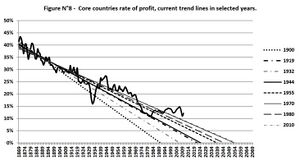Crisis
A crisis is when contradictions come to the fore. It is usually refers to an economic crisis associated with 'business cycles'.
Overview
Generally, two currents exist in Marxian economics: the first traces crises to underconsumption rooted in the working class, the bulk of the consumers, producing more than they themselves can buy; the second sees crises more as a result of the tendency of the rate of profit to fall.
Types of Crises
The Crisis of the Absolute-Over Accumulation of Capital
The crisis of the absolute over-accumulation of capital happens when the methods of production are revolutionised at a rate lower than require to maintain a net positive rate of the accumulation of capital. Under the theoretical conditions when the methods of production are not revolutionised, the extraction of surplus value can be increased by increasing the rate of exploitation, expanding the rate of exploited labour-power, and mobilising natural resources. Once these options have been exhausted the crisis comes to the fore.
State-capitalist regimes have demonstrated the tendency to suffer from this particular crisis.
Historical Economic Crises
The Great Depression (1929-1930s)
The Great Recession (2007-2010s)
David Harvey and other Marxists argue that the Great Recession occurred as a result of underconsumption. To compensate for the lack of wages credit was supplied to consumers to spur the accumulation of capital. This resulted in the rise of debt and the subsequent debt crisis.
Marxist economist Andrew Kliman argues that the rate of profit has demonstrated an empirical persistent tendency to fall. Economies can recover through the destruction of capital, which allows for the restoring of the rate of profits. The crises of the 1970s and 1980s, however, insufficiently destroyed capital (due to anticyclical policies following World War II). The rate of profits was therefore not sufficiently restored. The debt crisis in particular, Kliman argues, is the consequence of sluggish rate of profit and reduced tax revenues lead to government budget deficits and debt.
